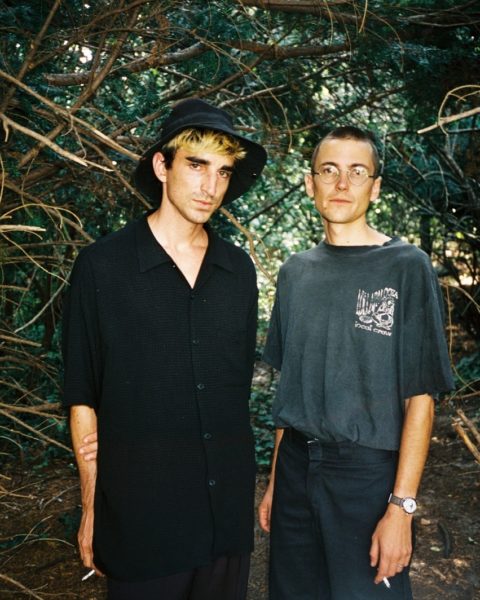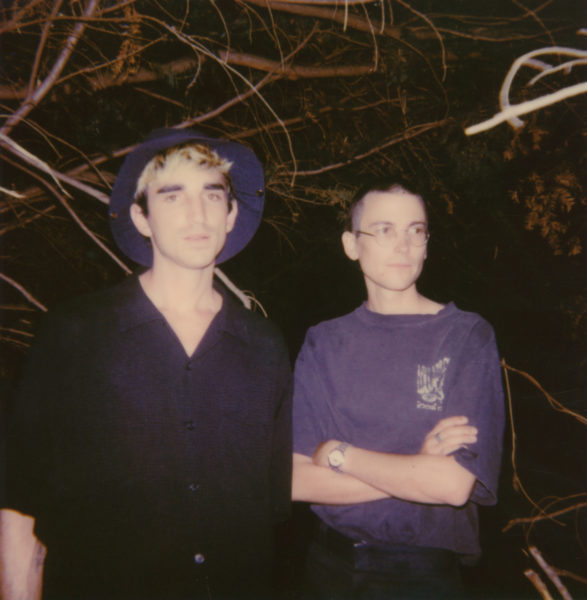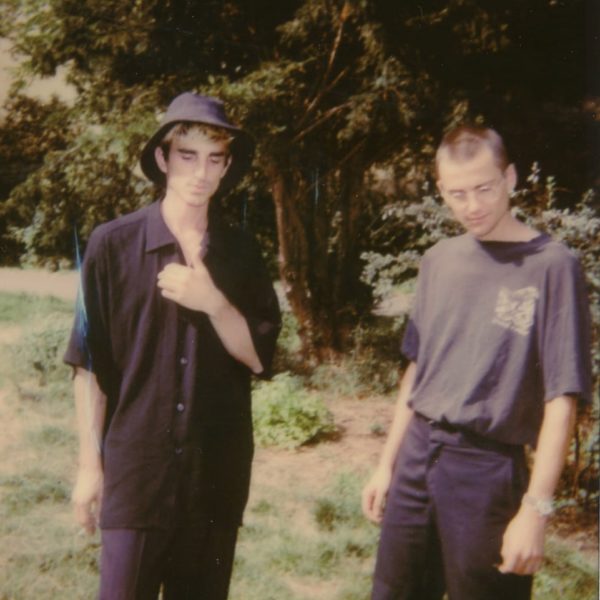There has been much ado about DIIV and especially their frontman Zachary Cole Smith, for not just musical reasons. As Colin Caulfield revealed in a recent Instagram post, the band broke up in 2016, around the release of their sophomore album Is The Is Are. While the album focussed on Cole getting over his drug addiction, it became clear soon after that he wasn’t fully recovered with the band cancelling their Europe tour.
As I meet Zachary Cole Smith and Colin Caulfield on a hot summer day in Berlin, it’s obvious that a lot changed in the past three years. Their new record Deceiver is – once again – dedicated to sobriety, but this time, DIIV mean it. There’s a lot of reincarnation going on – not just in the band members’ mindset, but also in their sound. Deceiver is less feel-good lo-fi indie rock, but a lot more shoegazey and grungey. Yet – despite their inclination towards darkness – there’s also a lot of hope within the songs, as they explain.
A reborn band
Considering that Deceiver seems to be a new chapter for the band: Do you believe in reincarnation?
Zachary Cole Smith: I think we believe in karma, I guess.
Colin Caulfield: Same. I think that works in a practical sense to the band starting over, it’s supposed to be reincarnated.
Zachary: The band was reborn.
To me, this record seems to be a lot darker than the previous one.
Z: I feel like making an uplifting record in 2019 just feels like an absolutely pointless exercise. So why do that?
C: But also I don’t think that it’s a bleak or hopeless record. It has a catharsis element to it.
Z: There are glimmers and there’s moments of hope on it. There’s a love song called Spark. There is hope, you have to find it. There’s some things that make us happy, but there’s a lot of shit that is terrible. I mean it’s a generally despairing time.
C: But I think I think that music previously had like that like a specifically breezy quality. You know, it had something to do with like the tempos being faster. So I think people may think that the new one is darker or something or more pensive or something.
You could also have that impression by just looking at the artwork. What was the idea behind it?
Z: We really wanted to have a black metal album color palette. Grey, purple, black and white, some red. And those were the colors that we were working with because that’s kind of what we thought would fit the record. The painting is like a Pinocchio mask. It was made by an Australian artist called Rhys Lee.

I’ve read that you’ve made over 300 demos for Is The Is Are. How was the process of putting the songs together this time?
Z: I think with making music by yourself there’s no feedback, you don’t get anything. So you just have to keep making stuff until you decide. But this record was way more of just the whole band. We were able to communicate with each other. There was a lot of talking and a lot of listening to music. Lots of learning. You know, listening to music and figuring out how it works.
C: We started with way, way fewer demos, though. We had mostly 16 songs that we’re actually working on and slowly little them down. But it wasn’t the same type of thing where we all brought millions.
“As we were making the songs like there was starting to be less and less stuff to hide behind.”
Listening to the record, it seems that the music sounds much clearer, compared to your previous work.
C: The music just has a really direct stark quality. There’s not a lot of like reverb or different kinds of hiding than here used to be. So I think it made sense for Cole to just make the lyrics much more clear.
Z: As we were making the songs there was starting to be less and less stuff to hide behind and a lot of the old DIIV tracks didn’t work because we started exposing everything more.
Another change was the production by Sonny DiPerri. How was it like to work with him?
C: It was great. We had to relearn how to communicate as a band for the first time in a different way. And so for a long time, it was the four of us in the practice space, just four hours a day, four months. By the time we got ready to record. We were in this really tight place and needed a really specific person to come in and help us record everything. And he was never over bearing, would only speak up, if you, really felt strongly about something. He’s really encouraging and kept it like it was. He is really good at helping us achieve different ideas we had about guitar sounds or drums.
Leaving New York
You’ve been focussing on your solo careers between the albums, as well.
C: We all went off for a while and did a bunch of different solo music. We were all like writing on our own time, which just helped when we all got together. I think we had already been getting better at working on music and it was easier to tackle it, making it a rock record, which is a pretty challenging, it’s a lot of work. So it just helped. I think we’re all a bit more confident.
 In the mean time you’ve moved from New York to Los Angeles. How does the city influence your work?
In the mean time you’ve moved from New York to Los Angeles. How does the city influence your work?
Z: It’s better. We were talking a lot about last night, about how we are being older than we used to be and feel like usually people get as they get older, they kind of start to miss their time being young. We don’t fucking miss being young. We’ve all spent a lifetime growing up in the last two years or I have. I think moving to California is just the air moving out of New York. I am not 21 years old anymore, right? I don’t want to live in a room this size or go to the bar every night.
Z: Even just living in L.A. it’s so much easier to be a band and we all live in the same neighborhood. In New York, we rarely have rehearsal space, the space that we rode to and from together. Whereas in New York, you live in separate areas. And when the rehearsal is done, you kind of just hang your head and stumble into the subway. It’s just hard to reach a closeness as a band in New York because it’s harder.
C: Yeah, I mean, they both feel like that to me. That’s true. They’re both like big mega-cities in the US and they’re both cultural capitals and like totally different ways like Hollywood in Manhattan or whatever. But, I think Cole’s right.
New York, I just associate with youth and not sleeping and being broke in a good way, but now I just don’t want it. We’re all we’re grateful for the experience we had there, but sometimes you just gotta put to rest.

Deceiver also focusses on your sobriety. How it is being sober in a society that wants to be constantly high?
Z: There’s a part of society that’s all altering their state of mind. But especially where we found ourselves in California, there’s a really big community of sober people. Part of sobriety is getting used to just being surrounded by a culture of hedonism. It reminds me of when I was 18 and decided not to eat meat. When I look look at a burger on the table, it doesn’t look like food to me. And its the same thing with alcohol. If that was a beer or something, I wouldn’t drink that. I’m lucky that I live in a place where it’s pretty acceptable. It’s kind of more fun to be sober around drunk people I think where you just act like an idiot on purpose.
All photos by Louisa Zimmer



